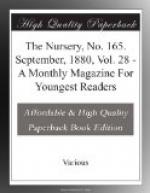ROSA BONHEUR.
About forty years ago, at an exhibition of paintings in Paris, two small pictures attracted great attention. One was called “Goats and Sheep;” the other, “Two Rabbits.”
They were wonderfully true to life; and what made them still more remarkable was, that they were the production of a girl only nineteen years old. That young French girl, Rosalie Bonheur, is now the famous artist known the world over as “Rosa Bonheur.”
She was born in Bordeaux in 1822. Her father, Raymond Bonheur, was an artist of much merit, and he was her first teacher. From earliest youth she had a great fondness for animals, and delighted in studying their habits.
So, naturally enough, she made animals the subjects of her pictures, and it is in this peculiar department of art that she has become eminent. Her works are quite numerous and widely known. One of the most famous is her “Horse-Fair,” which was the chief attraction of the Paris Exhibition in 1853.
She is still practising her art; and in addition to that she is the directress of a gratuitous “School of Design” for young girls. When Paris was besieged by the Prussians, the studio and residence of Rosa Bonheur were spared and respected by special order of the crown prince.
Auguste Bonheur, a younger sister of Rosa, and one of her pupils, has also gained a high reputation as an artist. She, too, excels as a painter of animals.
We give as a frontispiece to this number an engraving of one of her pictures, and we will let the picture tell its own story. It is a work that would do credit to the famous Rosa herself.
ALFRED SELWYN.
PIP AND POP.
[Illustration: Pip And Pop.]
Pip.—Well, cousin Pop, how goes the world with you? Do you find any worms?
Pop.—Not a sign of one! What is to become of the race of sparrows, I don’t know. The spring is late and chilly. There is still frost in the ground.
Pip.—Not even a fly have I caught this blessed day.
Pop.—Just my luck, friend Pop! If it weren’t for the crumbs a little girl throws out for me every day, I should starve.
Pip.—I should like to know that little girl. Where does she live?
Pop.—She is at school now. But come with me about two o’clock, and you shall be fed.
Pip.—Thank you, cousin. I’ll do as much for you one of these days. I have heard of a little girl in Ohio, who feeds the birds so well, that they follow her into the house, light on her head, and play with her.
Pop.—A thought strikes me, cousin. The little girl who feeds me is just as good as the Ohio girl; but I am not as good as the Ohio birds. I have not trusted her as I ought to. I have not lighted on her head. I have not followed her into the house.




